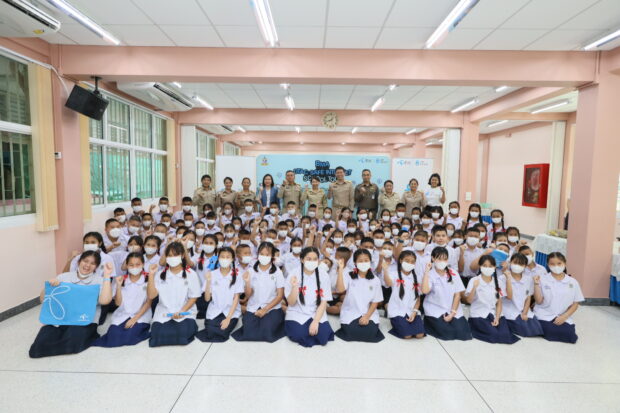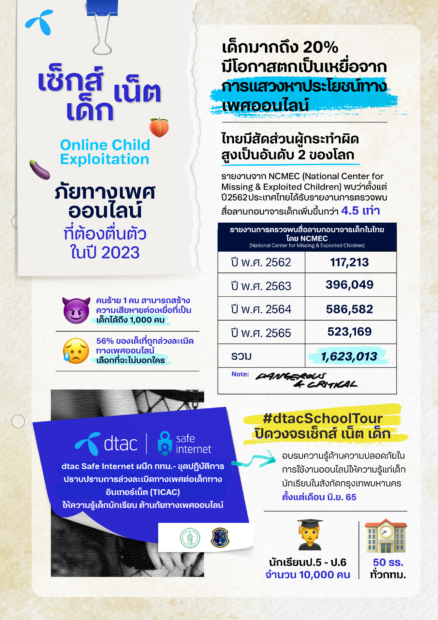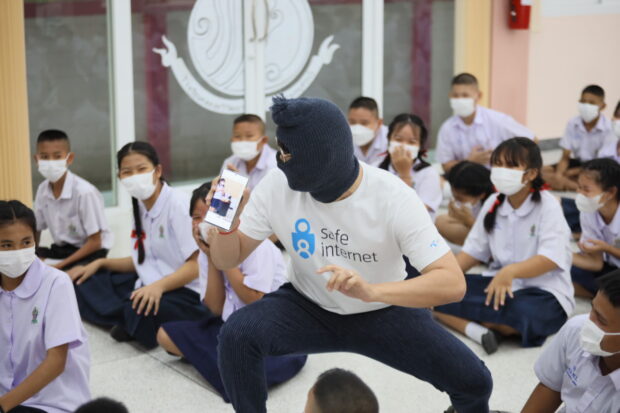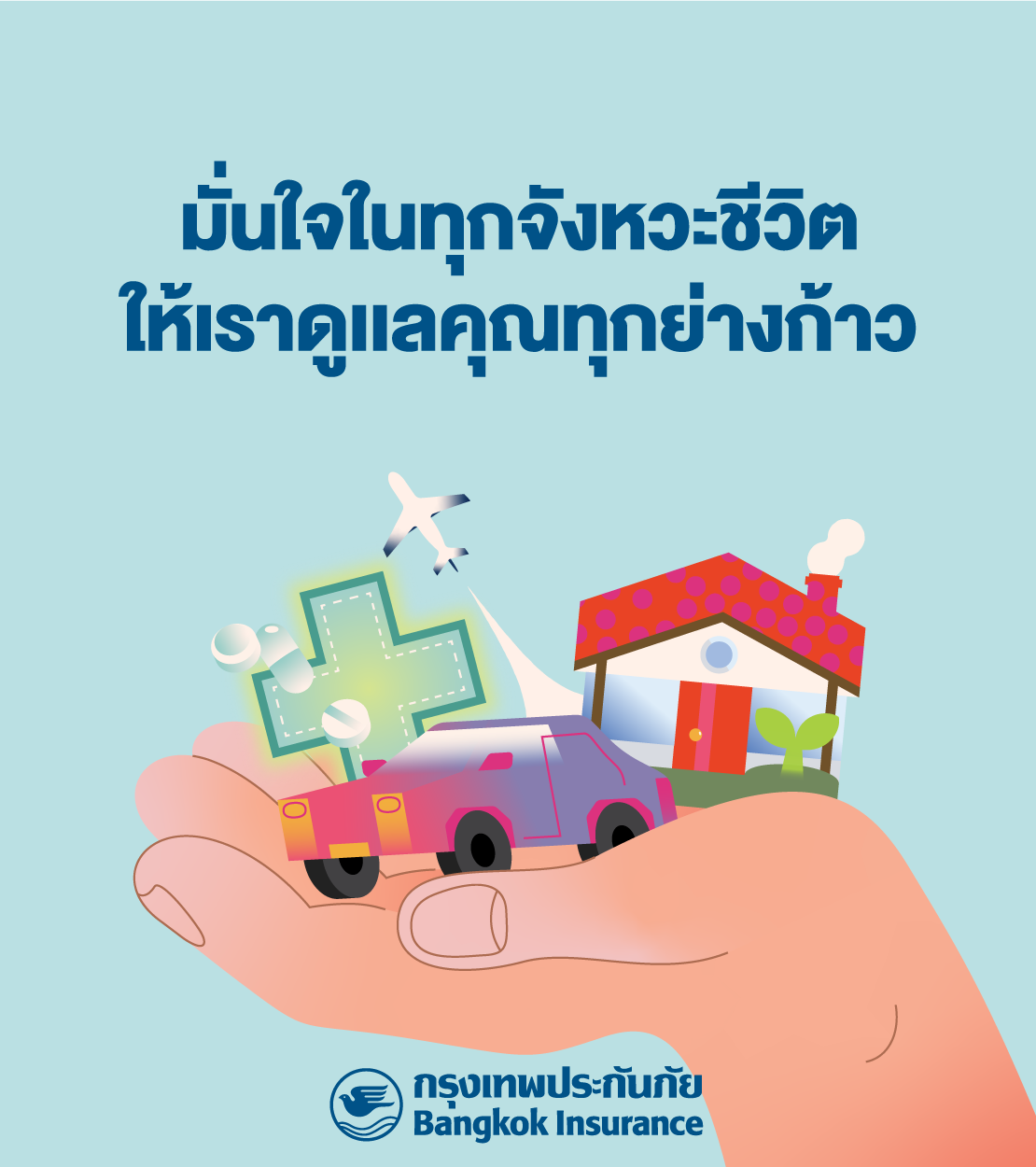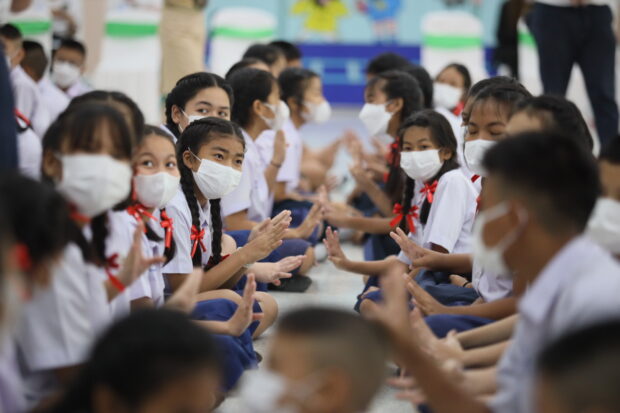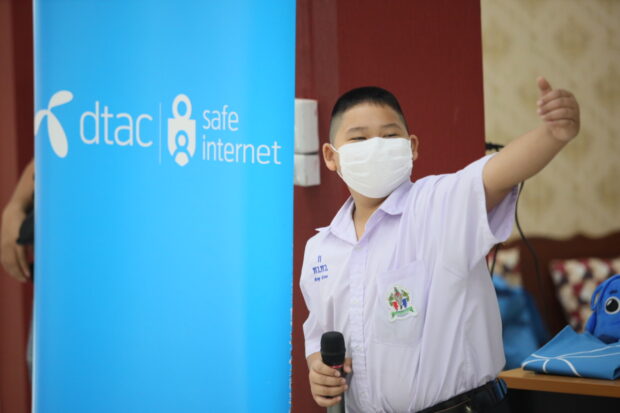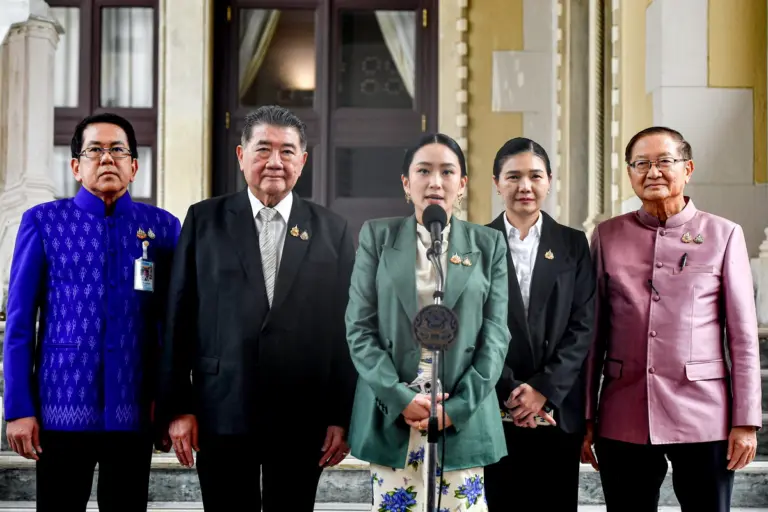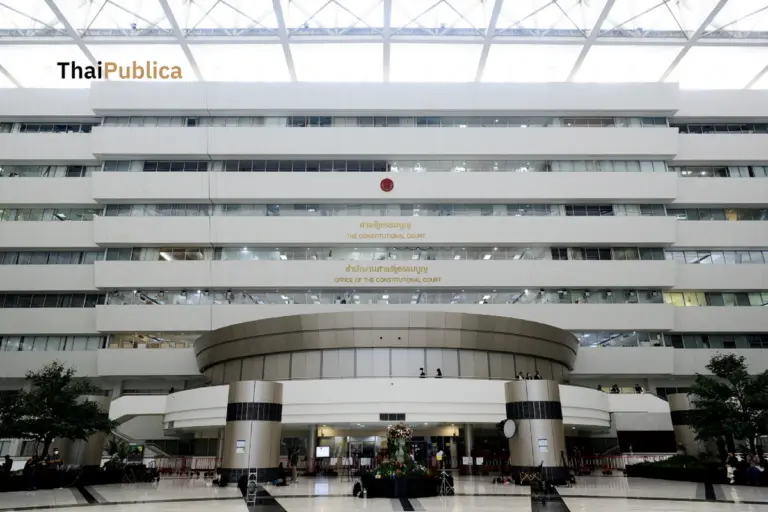เด็กมากกว่า 20% มีโอกาสตกเป็นเหยื่อจากการแสวงหาประโยชน์ทางเพศออนไลน์ ขณะที่ไทยมีจำนวนรายงานการล่วงละเมิดทางเพศทางออนไลน์รั้งอันดับ 2 ของโลก เว็บมืดเติบโตขึ้น 5 เท่า!
ดีแทคจับมือกรุงเทพมหานครและกลุ่มงานต่อต้านการล่วงละเมิดทางเพศต่อเด็กทางอินเทอร์เน็ต ตำรวจไซเบอร์ (TICAC-CCIB) ออนทัวร์ให้ความรู้เด็กนักเรียนสังกัด กทม. หลังข้อมูลชี้เด็กไทยเสี่ยงตกเป็นเหยื่อจากการแสวงหาประโยชน์ทางเพศออนไลน์ (Online Child Exploitation) สูงถึง 20% สัดส่วนผู้กระทำผิดสูงเป็นอันดับ 2 ของโลก ความเหลื่อมล้ำซัดเด็กแพร่ภาพของตัวเองแลกเงิน ด้านดีแทคตั้งเป้าพัฒนาความรู้ครอบคลุมนักเรียนประถมปลายทั่วประเทศภายใต้โครงการ ดีแทค Safe Internet
เด็กไทยตกอยู่ในความเสี่ยง
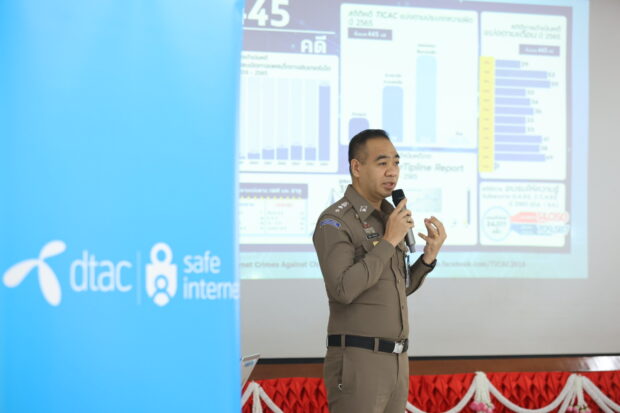
พ.ต.อ.รุ่งเลิศ คันธจันทร์ ผู้กำกับกลุ่มงานต่อต้านการล่วงละเมิดทางเพศต่อเด็กทางอินเทอร์เน็ต ในฐานะผู้ปฏิบัติงานในชุดปฏิบัติการปราบปรามการล่วงละเมิดทางเพศต่อเด็กทางอินเทอร์เน็ต (TICAC)
พ.ต.อ.รุ่งเลิศ คันธจันทร์ ผู้กำกับกลุ่มงานต่อต้านการล่วงละเมิดทางเพศต่อเด็กทางอินเทอร์เน็ต ในฐานะผู้ปฏิบัติงานในชุดปฏิบัติการปราบปรามการล่วงละเมิดทางเพศต่อเด็กทางอินเทอร์เน็ต (TICAC) กล่าวว่า ประเทศไทยกำลังตกอยู่ในความเสี่ยง และเผชิญกับความท้าทายที่รุนแรงจากการเผยแพร่สื่อที่มีการล่วงละเมิดทางเพศต่อเด็กทางออนไลน์ ถ้าดูจากสถิติที่ได้รับรายงานจาก NCMEC พบว่าตั้งแต่ปี 2562 ประเทศไทยได้รับรายงานการตรวจพบสื่อลามกอนาจารเด็กเพิ่มมากขึ้นอย่างมีนัยยะสำคัญ โดยในปี 2562 พบ 117,213 รายงาน ในปี 2563 พบ 396,049 รายงาน ในปี 2564 พบ 586,582 รายงาน และในปี 2565 พบ 523,169 รายงาน ซึ่งทางสำนักงานตำรวจแห่งชาติก็มีการจับกุมตัวผู้กระทำความผิดได้เพิ่มมากขึ้นด้วยเช่นกัน ขณะเดียวกัน พบว่าเว็บมืดซึ่งมีวัตถุประสงค์หลักในการหาแสวงผลประโยชน์ทางเพศจากเด็กในไทยยังมีการเติบโตสูงถึง 5 เท่า
จากสถิติของสำนักงานตำรวจแห่งชาติพบว่า คนร้าย 1 คน สามารถสร้างความเสียหายต่อเหยื่อที่เป็นเด็กได้ถึง 1,000 คน เด็กถึง 20% มีโอกาสตกเป็นเหยื่อจากการแสวงหาประโยชน์ทางเพศออนไลน์ และเมื่อตกเป็นเหยื่อแล้ว พบว่า 56% ของเด็กเลือกที่จะไม่บอกใคร ทั้งนี้ ความเหลื่อมล้ำทางเศรษฐกิจและไม่เท่าเทียมทางรายได้ยังส่งผลให้เด็กและเยาวชนใช้เทคโนโลยีดิจิทัลผลิตและเผยแพร่ภาพหรือวิดีโอทางเพศด้วยตัวเอง เพื่อแลกเปลี่ยนเป็นเงินหรือสิ่งของต่างๆ
“การสื่อสารออนไลน์เป็นช่องทางสำคัญที่ช่วยให้ผู้กระทำผิดเข้าถึงตัวเด็กได้ง่ายและรวดเร็ว ใช้ประโยชน์จากความเปราะบางของเด็กเพื่อหลอกลวง บีบบังคับ ชักชวน และแสวงหาประโยชน์จากพวกเขา กลไกการคุกคามของอาชญากรถือเป็นความผิดฐานค้ามนุษย์ ซึ่งเป็นอาชญากรรมที่ร้ายแรง ทำลายซึ่งสิทธิ เสรีภาพ ศักดิ์ศรี และความมั่นคงของมนุษย์” พ.ต.อ.รุ่งเลิศ กล่าว
อย่างไรก็ตาม ตามกฎหมายไทย ความผิดจะเกิดขึ้นก็ต่อเมื่อมีความเสียหายเกิดขึ้นเป็นที่เรียบร้อยแล้วเท่านั้น ตำรวจไม่สามารถแจ้งความผิดต่ออาชญากรได้ในขั้นตอนแสวงหา ไม่ว่าจะเป็นการสอดส่องพฤติกรรมตัวตนและความชอบของเหยื่อ (Cyber Stalking) การสร้างความเป็นมิตร เข้ามาตีสนิทให้เด็กตายใจเพื่อล่วงละเมิดทางเพศในภายหลัง (Child Grooming) รวมถึงบทสนทนาว่าด้วยเรื่องเพศ (Sexting) ดังนั้น การเสริมสร้างภูมิคุ้มกันดิจิทัลให้เด็กด้วยองค์ความรู้ รู้จักระแวดระวังและแนวทางการรับมือกับปัญหาจึงมีความสำคัญอย่างยิ่ง ก่อนที่จะเกิดเหตุบานปลายขึ้น ซึ่งอาชญากรไซเบอร์นั้นจะเก็บภาพเหยื่อไว้บนออนไลน์ (Digital footprint) ซึ่งยากต่อการลบให้หมดไปอย่างสิ้นเชิง
กทม. เข้ม Online Child Exploitation
นายศานนท์ หวังสร้างบุญ รองผู้ว่าราชการกรุงเทพมหานคร กล่าวว่า ปัจจุบันมีโรงเรียนในสังกัด กทม. ทั้งสิ้น 437 โรงเรียน ครอบคลุม 50 เขต นักเรียนทั้งสิ้น 261,160 คน นับตั้งแต่เดือน มิถุนายน 2565 ที่ผ่านมา กรุงเทพมหานครได้ร่วมมือกับ dtac Safe Internet ในการอบรมความรู้ด้านความปลอดภัยในการใช้งานออนไลน์ให้ความรู้แก่เด็กนักเรียนในสังกัดกรุงเทพมหานครอายุระหว่าง 11-13 ปี (ป.5-6) จำนวน 50 โรงเรียน กว่า 10,000 คน ผ่านคาบเรียน “BMA x dtac Safe Internet School Tour” เพื่อให้มีองค์ความรู้และภูมิคุ้มกันต่อภัยการแสวงหาประโยชน์ทางเพศออนไลน์ เข้าใจถึงกระบวนการและสามารถรับมือได้อย่างทันท่วงที จากการลงพื้นที่อบรมที่ผ่านมาพบว่า นักเรียนราว 3% เคยถูกร้องขอ ข่มขู่หรือกดดันให้ส่งรูปภาพหรือทำพฤติกรรมทางเพศทางออนไลน์ 13% เคยส่งรูปภาพ วิดีโอ หรือข้อมูลส่วนตัวให้คนแปลกหน้า และ 3% เคยได้รับภาพ ข้อความหรือวิดีโอที่มีเนื้อหาส่อไปทางเพศ โดยช่องทางที่มิจฉาชีพแฝงตัวเข้ามา ประกอบไปด้วย ช่องทางโซเชียลมีเดีย เกมส์ออนไลน์ รวมถึงแอปพลิชั่นใหม่ๆ ที่ผู้ใหญ่ยังไม่คุ้นเคย
“ข้อมูลจากทางตำรวจและแบบสำรวจที่ กทม. จัดทำร่วมกับ ดีแทค สะท้อนถึงความรุนแรงของปัญหาที่ต้องได้รับการแก้ไขอย่างเร่งด่วน ซึ่งในฐานะรองผู้ว่าฯ ที่ดูแลโรงเรียนในสังกัด กทม. พร้อมยกปัญหานี้เป็นเรื่องเร่งด่วนที่ต้องได้รับการแก้ไขผ่านการอบรม ให้ความรู้ สร้างภูมิคุ้มกันทางดิจิทัล” นายศานนท์ กล่าว
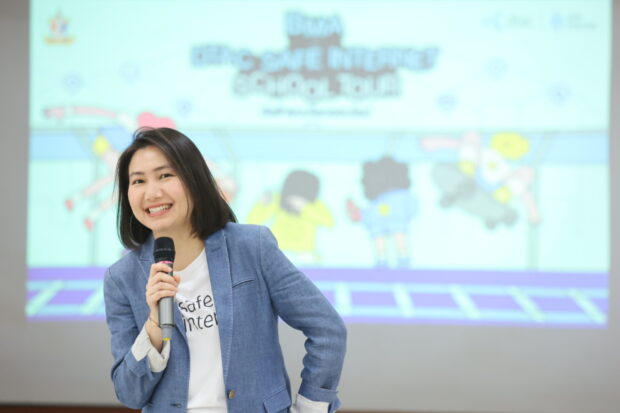
นางอรอุมา ฤกษ์พัฒนาพิพัฒน์ ผู้อำนวยการอาวุโส สายงานสื่อสารองค์กรและความยั่งยืน บริษัท โทเทิ่ลแอ็คเซ็ส คอมมูนิเคชั่น จำกัด (มหาชน) หรือดีแทค
ดีแทคทำหลักสูตรเข้าถึงประถมปลายทั่วประเทศ
ความรุนแรงของภัยการแสวงหาประโยชน์และการล่วงละเมิดทางเพศต่อเด็กทางออนไลน์เป็นภัยคุกคามที่องค์การสหประชาชาติ (United Nations: UN) มีวาระให้บรรจุอยู่ในเป้าหมายการพัฒนาอย่างยั่งยืน (SDGs) ภายในปี 2573 ดังข้อต่อไปนี้ ข้อ 5.2 ขจัดความรุนแรงทุกรูปแบบที่มีต่อผู้หญิงและเด็กหญิงทั้งในที่สาธารณะและที่รโหฐาน รวมถึงการค้ามนุษย์ การกระทำทางเพศ และการแสวงประโยชน์ในรูปแบบอื่น และข้อ 16.2 ยุติการข่มแหง การใช้หาประโยชน์อย่างไม่ถูกต้อง การค้ามนุษย์ และความรุนแรงและการทรมานทุกรูปแบบที่มีต่อเด็ก
นางอรอุมา ฤกษ์พัฒนาพิพัฒน์ ผู้อำนวยการอาวุโส สายงานสื่อสารองค์กรและความยั่งยืน บริษัท โทเทิ่ลแอ็คเซ็ส คอมมูนิเคชั่น จำกัด (มหาชน) หรือดีแทค กล่าวว่า ดีแทค ในฐานะผู้ให้บริการโทรคมนาคม ตระหนักถึงภัยออนไลน์ที่เกี่ยวกับการแสวงหาประโยชน์และการล่วงละเมิดทางเพศต่อเด็กทางออนไลน์ ดังนั้น ภายใต้โครงการดีแทค Safe Internet จึงมุ่งส่งเสริมศักยภาพในการเข้าถึงทรัพยากรการศึกษา การให้ความรู้แก่เด็กและครูเกี่ยวกับการความปลอดภัยและการใช้งานอินเทอร์เน็ตอย่างมีความรับผิดชอบ โดยได้ร่วมมือกับสำนักการศึกษากรุงเทพมหาครตั้งแต่ปี พ.ศ. 2565 จัดทำหลักสูตรและกิจกรรมส่งเสริมการตระหนักรู้ในเรื่องการแสวงหาผลประโยชน์ทางเพศทั้งรูปแบบออนไลน์และออฟไลน์ที่มีมูลนิธิอินเทอร์เน็ตร่วมพัฒนาไทยให้ความร่วมมือและริเริ่มในการหยุดยั้งภัยดังกล่าว รวมถึงการสร้างความตระหนักรู้ต่อสังคมและการมีส่วนร่วมของพลเมืองอินเทอร์เน็ตผ่านแคมเปญการสื่อสาร และจะขยายผลการอบรมให้ครอบคลุมนักเรียนที่กำลังศึกษาอยู่ในชั้นประถมปีที่ 5-6 ทั่วประเทศ เริ่มตั้งแต่ปีนี้เป็นต้นไป
“การเพิ่มภูมิคุ้มกันให้กับเด็กและเยาวชนเป็นเพียงจุดเริ่มต้นในการรับมือกับปัญหานี้เท่านั้น เพราะการจบปัญหานี้ยังคงต้องการผนึกกำลังระหว่างภาครัฐ ภาคเอกชน และภาคประชาสังคม ที่ช่วยกันสร้างความตระหนักในสังคม และบังคับใช้กฎหมายได้อย่างเป็นระบบและตัดตอนได้อย่างทันท่วงที” นางอรอุมา กล่าวทิ้งท้าย
……………
dtac Safe Internet Joins Forces with BMA, TICAC in Educating Students for Prevention of Online
Child Exploitation 20% of children are at risk of being exploited online. Thailand ranks 2nd in the world on online sexual exploitation of children, with the number of dark webs growing by five times.
9 January 2023 – dtac has joined forces with the Bangkok Metropolitan Administration (BMA) and the Thailand Internet Crimes Against Children (TICAC) Taskforce in a school tour to educate students at BMA-run educational institutes about online risks. The tour kicked off after findings show 20 per cent of Thai children are at risk of being sexually exploited online. Across the world, Thailand ranks 2nd when it comes to the percentage of online exploitation of children. Some Thai youngsters have exposed images of themselves online for money, poignantly exposing inequalities in the country. Over 2023, dtac aims to educate senior primary students across Thailand about online-exploitation threats via dtac Safe Internet project.
Thai Children are at Risk
Police Colonel Runglert Kantajan, superintendent of the TICAC Unit, said in his capacity as the head of the TICAC Taskforce that there were big risks of online child exploitation in Thailand. The report by National Center for Missing & Exploited Children (NCMEC) shows a significant increase in reports of Child Pornography detection in Thailand, with 117,213 reports in 2019, 396,049 reports in 2020, 586,582 reports in 2021 and 523,169 reported in 2022. In addition, the number of dark webs containing sexual exploitation content of Thai children also grew by five times compared with the previous year.
According to the Royal Thai Police’s statistics, one predator can victimize up to 1,000 children. Therefore, up to 20 per cent of Thai children are at risk of being sexually exploited online. Of all child victims, 56 per cent have chosen to keep quiet about their ordeals. Struggling with economic inequalities and income gaps, some Thai youngsters have also agreed to show their sexual images or VDO clips in exchange for money or gifts.
“Online communications significantly enable predators to connect with children fast and easily. Exploiting children’s vulnerabilities, they use lies, coercion, and pressure to get what they want from children. These criminals’ offences are considered human trafficking. Their crimes are grave in nature because they hurt the rights, liberties, dignity, and security of other humans,” he said.
Thai laws, so far, impose action against predators only after damages are done. Police therefore cannot do anything when potential predators just engage in Cyber Stalking, Grooming, or Sexting. Boosting children’s digital literacy and guards against online sexual exploitation therefore has crucial importance. If such crimes happen, there are always digital footprints that are hard to be wiped out completely.
BMA Toughens Up Against Online Child Exploitation
Sanon Wangsrangboon, a deputy governor of Bangkok, said BMA had operated 437 schools across all 50 Bangkok districts. These schools have taught 261,160 students. From June 2022, BMA has partnered with dtac Safe Internet in promoting safe internet usage among BMA-run schools’ students. To date, the “BMA x dtac Safe Internet School Tour” training has already covered more than 10,000 students aged between 11 and 13 years old (Pathom 4 – 5 levels) with aim to boost students’ immunity against online child exploitation. As the training raises children’s understanding of sexual exploitation and processes, they will be able to properly handle risks. Surveys during training reveal that about three per cent of students were asked, threatened, or pressured to send sexual images or commit sexual acts online. Up to 13 per cent of these students have digitally sent their images, video clips or personal information to strangers. About three per cent have received sexually-suggestive images, texts or video clips. Predators have reached out to children via social media, online games and new applications that are not yet popular among adults.
“Police records and surveys conducted under BMA – dtac collaboration have reflected the severity of online child exploitation, which needs to be urgently addressed. As the deputy Bangkok governor in charge of BMA-run schools, I am ready to prioritize efforts to solve this problem. We must urgently educate children and boost their digital literacy to stop this problem,” Mr. Sanon said.
dtac’s Training Targets Senior Primary Students
Recognizing the severity of online child exploitation, the United Nations (UN) has addressed it in Sustainable Development Goals (SDGs). Targeted for fulfilment by 2030, Item 5.2 of SDGs seeks to eliminate all forms of violence against all women and girls in public and private spheres, including trafficking and sexual and other types of exploitation, while Item 16.2 aims to end abuse, exploitation, trafficking and all forms of violence and torture against children.
On-uma Rerkpattanapipat, senior vice president for the Communications and Sustainability Division at Total Access Communication Public Company Limited or dtac, said as a telecom operator dtac was aware of online child exploitation that included sexual abuse. dtac Safe Internet project therefore not only boosts children’s access to educational resources but also promotes responsible & safe internet usage among students and teachers. Since 2022, dtac Safe Internet project has worked with the BMA’s Department of Education in conducting training and activities to raise awareness and understanding of online and offline sexual exploitation. Efforts have also been made under the collaboration to raise public awareness of the issue and engage netizens in combating the problem through communication campaigns. dtac now plans to expand the training further to cover Pathom 5 and 6 students nationwide from this year onward.
“Boosting youth’s immunity against online child exploitation marks the start of our efforts to tackle this problem. We know the complete eradication of online child exploitation requires the government sector, the private sector, and civil society to work together in raising public awareness of the online child exploitation, supporting strong legal enforcement, and fostering timely response,” Ms. On-uma said.

